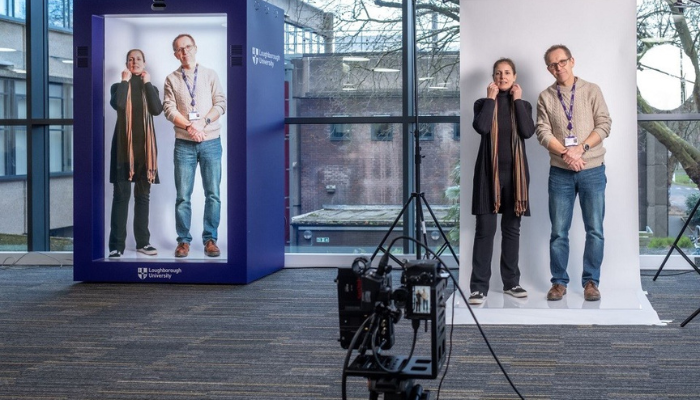
Last updated on March 23rd, 2024 at 08:10 am
AI-driven technology that tests realistic avatars piloted at Loughborough University
Any university instructor will attest that drawing students to an early morning lecture is an uphill battle. However, even the most groggy freshman would likely be intrigued by a physics lecture by Albert Einstein or a design workshop led by Coco Chanel.
This scenario could soon become a reality for British students, as some universities are beginning to beam in guest lecturers from around the world using holographic technology, similar to that used to resurrect deceased or retired singers on stage.
Loughborough University, the first in Europe to explore this technology’s possibilities, intends to utilize it to bring in sports scientists from the Massachusetts Institute of Technology (MIT) to instruct fashion students in creating immersive shows, and to challenge management students with navigating complex business scenarios.
Professor Vikki Locke, the director of undergraduate studies at Loughborough Business School, expressed that students have shown a strong affinity for the technology, with many requesting selfies with the gadget. She noted that they prefer “a guest speaker from industry beaming into a classroom to a 2D person on the wall.”
Locke explained that Zoom calls made students “feel like they were watching TV… there’s a distance. A holographic image is a lot more engaging and real to them.”
The technology is set to be officially integrated into the curriculum in 2025 following a year of experimentation.
The holographic units, based on box technology, are marketed by LA-based Proto. Their clientele includes companies like BT and IBM, where the units are used in meetings to minimize the requirement for corporate travel. Proto also collaborates with the fashion retailer H&M in Stockholm to create interactive product displays.
David Nussbaum, the founder of Proto, established the company four years ago after his involvement with holograms of deceased celebrities. He mentioned that his company could soon revive some of the greatest thinkers of the 20th century.
He mentioned, “Proto has the technology to project an image of Stephen Hawking, or anyone else, making it appear as if he is truly present. We can integrate it with books, lectures, social media—anything he was associated with, any question, any interaction with him. An AI Stephen Hawking would resemble him, sound like him, and interact as if it were him.
“It’s awe-inspiring, it’s astonishing. I’ve been amazed at how incredible the interactions are. AI is a part of our lives, whether people embrace it or not.” He also stated that his company’s goal was to demonstrate “you shouldn’t need to be an eccentric millionaire or a celebrity to have a hologram.”
Gary Burnett, a professor of digital creativity at Loughborough University, remarked, “Various immersive technologies and AI represent the new types of literacy. Students must comprehend the implications of using them, being immersed in those environments, experiencing them, interacting with them… These are all skills they will require for their future professions.”
The university’s pro-vice-chancellor, Prof Rachel Thomson, mentioned that the technology could assist the university in achieving its sustainability strategy by reducing the necessity for flying in guest speakers and enabling international research collaborations. Additionally, it could reduce the amount of material used by students constructing prototypes in engineering, design, and the creative arts.
Furthermore, the technology could simplify the display of complex equipment, such as an engine, for lecturers compared to using a video call.
Nussbaum indicated that businesses and large institutions like universities were the initial focus of his firm’s plan. However, he hopes to introduce smaller units costing under $1,000 (£800) within the next 18 months. These units would project a reduced-size image, similar to “Wonkavision” in Roald Dahl’s Charlie and the Chocolate Factory.
He added that the technology’s AI capabilities enable the creation of an avatar resembling anyone worldwide, although he acknowledged potential legal complications.




